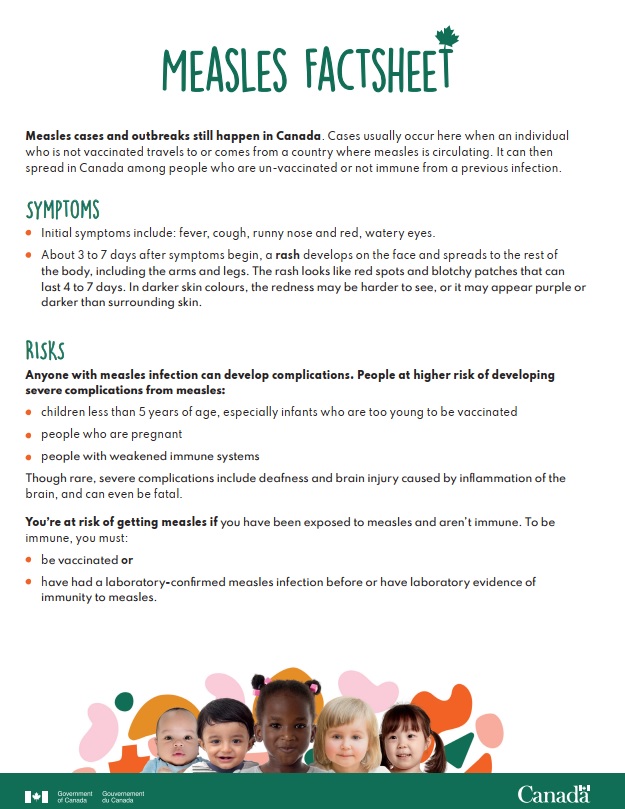Measles: What you should know (factsheet)
Download in PDF format
(332 KB, 2 pages)
Organization: Public Health Agency of Canada
Date published: 2024-06-07
Measles cases and outbreaks still happen in Canada. Cases usually occur here when an individual who is not vaccinated travels to or comes from a country where measles is circulating. It can then spread in Canada among people who are un-vaccinated or not immune from a previous infection.
Symptoms
Initial symptoms include: fever, cough, runny nose and red, watery eyes.
About 3 to 7 days after symptoms begin, a rash develops on the face and spreads to the rest of the body, including the arms and legs. The rash looks like red spots and blotchy patches that can last 4 to 7 days. In darker skin colours, the redness may be harder to see, or it may appear purple or darker than surrounding skin.
Risks
Anyone with measles infection can develop complications. People at higher risk of developing severe complications from measles:
- children less than 5 years of age, especially infants who are too young to be vaccinated
- people who are pregnant
- people with weakened immune systems
Though rare, severe complications include deafness and brain injury caused by inflammation of the brain, and can even be fatal.
You're at risk of getting measles if you have been exposed to measles and aren't immune. To be immune, you must:
- be vaccinated or
- have had a laboratory-confirmed measles infection before or have laboratory evidence of immunity to measles
Measles is very contagious.
Over 90% of people who aren't immune to measles and who come into contact with the virus can become infected. People infected with measles can spread it to others before the rash appears and therefore before they know they have a measles infection. Parents are urged to ensure that their child receives measles-containing vaccines according to their provincial or territorial vaccination schedule.
Preventing measles
Measles can be prevented with routine vaccinations, which typically begins at 12 months of age. If you or your child missed a vaccine, you can still catch up.
Having 2 doses of a measles-containing vaccine is almost 100% effective at preventing measles. Two doses of measles-containing vaccine are recommended for children, adolescents and some adults. Check with your health care provider or local public health department about measles vaccination recommendations in your province or territory.
If you plan to travel outside of Canada, talk to a health care provider or local public health department preferably 6 weeks before travel to see if you are up to date with your vaccinations or need additional doses of a measles-containing vaccine.
If you think you have been exposed or have measles
If you believe you or your family may have been exposed to measles and have not been vaccinated (or have not had a measles infection in the past), isolate and contact your health care provider or local public health department immediately for guidance.
If you develop symptoms of measles, isolate and call a health care provider immediately. The health care provider can arrange to see you while preventing the spread to others.
Help stop the spread of measles.
Talk to a health care provider or your local public health department if you are not sure if you or your family are up to date with recommended vaccines and to catch up on any missing vaccines.
For more information, visit Canada.ca/childhood-vaccines.
